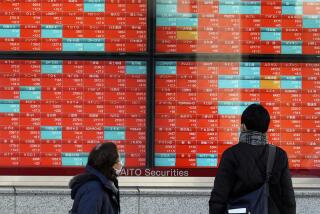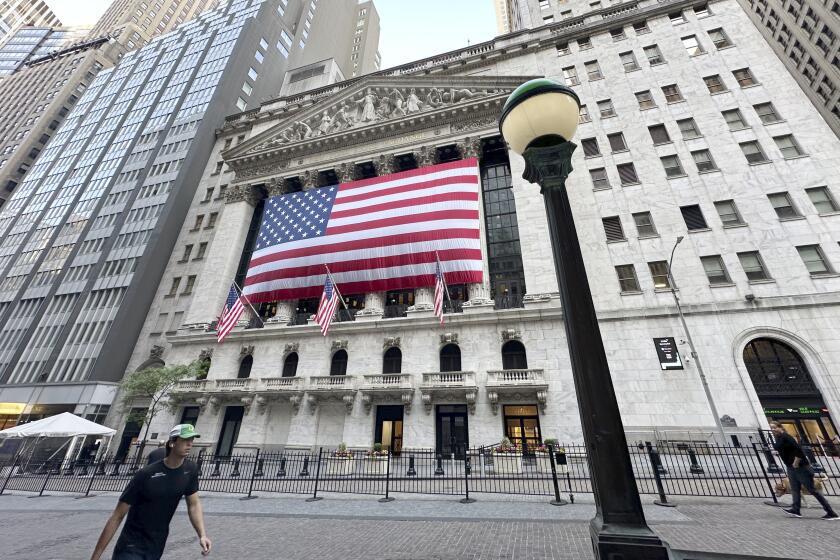Wall Street annual compensation expected to fall 15% to 30%
Wall Street’s sky-high annual bonuses are likely to fall a bit closer to earth this year.
Nearly everyone from the CEOs down to the entry-level analysts is preparing to see compensation cut as the end-of-year bonus season draws near. Although final decisions are weeks away, several reports issued recently are predicting that average 2011 compensation at global investment banks will drop between 15% and 30% from last year.
Banks have already reported they reduced compensation during the first three quarters of the year. Goldman Sachs Group Inc., the most-watched name on Wall Street, set aside $10 billion from January through September — that’s down 24% from the same period in 2010.
“Generally speaking, everybody is cutting back big time,” said Steven Eckhaus, an executive compensation expert at the law firm Katten Muchin Rosenman. “The mood is wary.”
Banks have said this year that business has been hurt by global economic uncertainty, volatile financial markets and tough new regulations from Washington. That led Options Group, a compensation consulting firm, to issue a report this week predicting that pay is likely to fall 27% from last year at investment banks in the U.S. and Europe. A similar recent report from Johnson Associates pegged the drop at between 15% and 30%.
This is a humbling turn of events for an industry that appeared to be doing much better than the rest of corporate America coming out of the financial crisis. Two years ago, Wall Street bonuses bounced back to the same levels they had reached before the crisis, and firms were hiring.
Compensation consultant James Reda said bonuses in the rest of corporate America are rising, thanks to aggressive cost cutting.
“It’s a pretty good year for corporations, as long as they aren’t in finance,” he said.
The latest quarterly reports from firms including JPMorgan Chase & Co. and Citigroup Inc. suggest profits may have rebounded somewhat in recent months. But industry analysts said most of the profits have come through accounting maneuvers and one-time items, not new business.
Investors have sent shares of investment banks and brokerages in the Standard & Poor’s 500 index down a staggering 43% this year, making it the worst-performing sector in an index down only 1% over the same period.
The falling stock prices mean that not only will bonuses be down this year, but stock options tied to compensation are now worth much less.
“I don’t think people are going to spend money on the cars and the apartments,” said Richard Lipstein, a managing director at Boyden, an executive search firm. “People are increasingly aware of just how much uncertainty there is in the financial services industry.”
The falling stock prices and bonuses are driven by the expectation that decades of steady growth on Wall Street may be coming to an end. The services and financial instruments that banks make their money from are likely to be less in demand if the global economy enters a period of slower growth, as many economists expect.
In addition, recent financial regulations are forcing banks to cut back on some profitable activities and retain more of their capital.
Nearly every firm has announced layoffs. Last month, Swiss banking giant UBS laid out a plan that would significantly shrink its investment bank over the next few years. And, unlike during past downturns, many of these jobs are not expected to return.
“There are lots of jobs that people made lots of money at that aren’t going to be there again in our lifetime,” Reda said.
The cutbacks are not hitting all divisions equally. The Options Group estimated that traditional mergers and acquisitions bankers may see their pay fall 14%, but bond traders face 33% pay cuts because of the rock-bottom interest rates that make trading difficult.
Even these drops won’t stop finance from being one of the most lucrative professions. For instance, Goldman Sachs set aside enough money through the first nine months of the year to pay each of its 34,200 employees an average of $292,000 in total compensation this year, a number likely to grow in the fourth quarter. But some analysts believe compensation may shrink in future years.
“Everybody expected things to come back and be what they were before,” Eckhaus said. “Now there’s an awareness that things may not be the same as they were.”






